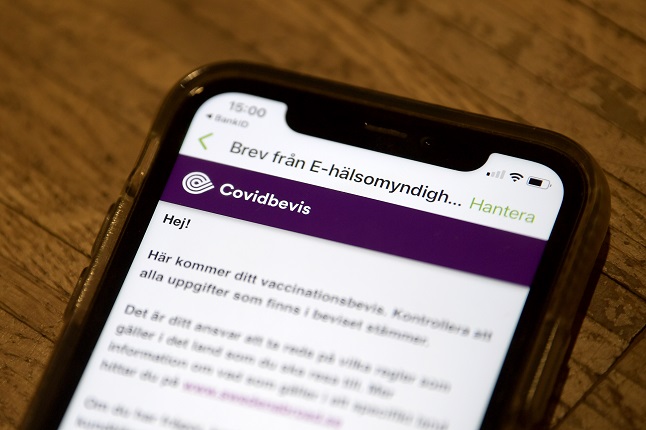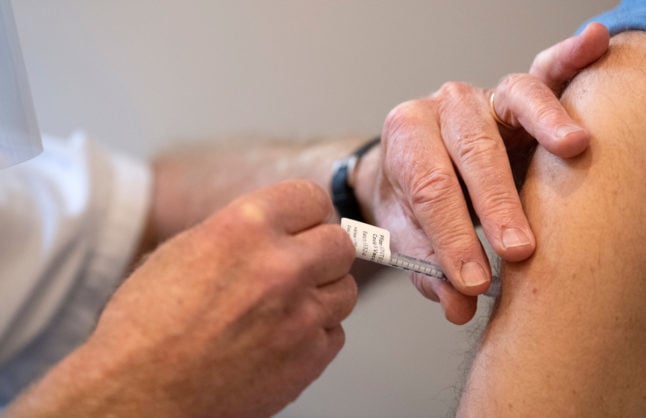Some of those excluded from the vaccine pass are those most dependent on EU travel.
Annie Wolohon moved to Stockholm just over two years ago, so that her partner could be close to his sons. Sadly, her partner died in early 2020. Since then Wolohon says she has been living in “limbo”, and is longing to travel home to Ireland to see friends and family for the first time in almost two years.
The reason is a ten-digit number, the Swedish social security number of personnummer which is the key to accessing services ranging from opening a bank account to joining a gym, and is used for almost all contact with Swedish authorities from doctors’ visits to paying taxes. To apply for the number, you need to meet a few criteria to prove that you have the right to reside legally in Sweden for at least one year. This often means proof of income, for example, or proof that you can support yourself.
Although Wolohon has been able to open a bank account and buy property, many parts of society remain closed off to her since her personnummer application was denied because her health insurance did not have maternity cover, even though she was aged over 50 and had already begun the menopause.
“I am not living like any normal citizen as I don’t have a personal number,” she explains. “I have been to the tax office on many different occasions and I always get a different answer.”
While EU citizens like Wolohon are allowed to move anywhere in the EU, there are still conditions – in Sweden, for example, it is only permitted to move to Sweden as a job seeker for a maximum of six months, meaning people in that situation would not get the number.
Others excluded from the system include students who will be in Sweden for less than a year, people on short-term work contracts, and others who cannot prove they have the legal right to live in Sweden for at least one year. Some of these people may be issued with a coordination number (samordningsnummer) instead, but this still requires certain criteria to be fulfilled. Without this, the alternative is a reserve number (reservnummer) which is used in the healthcare sector to identify patients without either of the two former numbers.
Then there are the people who have only recently arrived and not yet received their personnummer. The Swedish Tax Agency, the authority responsible for issuing the numbers, told The Local that the process has been hit by delays due to the pandemic.
“We are able to process most cases within four weeks, but it might take up to 18 weeks if it involves further investigation, or if we require any additional information,” Ylva Vesterlund, press secretary at the agency, said. “Current processing times are generally longer than usual due to the Covid-19 pandemic, which has affected our operations in several ways. We apologise for any inconvenience caused by these delays.”
During the pandemic, many people without a personnummer, including Wolohon, were unable to book a vaccine, despite the fact the vaccine was intended to be available to anyone living or “temporarily staying” in Sweden, and authorities’ repeated reassurance this included those without a personnummer.
After many phonecalls and persistence, Wolohon has now received two doses of the vaccine, but faces a new problem: accessing the Covid-19 vaccine pass.
These were introduced as part of an EU-wide scheme and facilitate travel to EU countries. There are two ways to get the Covid-19 pass in Sweden: through a digital ID, which itself requires having a personnummer, or through a paper form. This is different from other EU countries such as Germany, where the only requirements for the pass are a valid photo ID and the proof of vaccination issued at the appointment itself.
Sweden’s eHealth Agency initially told The Local that people with a samordningsnummer would be able to apply using the paper form only, but when the pass was launched on July 1st, we were told this was not the case. Annemieke Ålenius, deputy director general of the agency, told us this was because including samordningsnummer in the system was both “more complicated” and affected fewer people than expected.
In total, she said that around 4,000 people had been registered as vaccinated using a reservnummer as of late June, and just 800 with a samordningsnummer. These vaccines are still recorded in the National Vaccination Register for statistics purposes, but cannot be connected to individual people.
“The regions carry out the vaccination, and report into the National Vaccination Register the persons they have vaccinated. They can report the samordningsnummer or reservnummer. But the only information registered is the number, there is no name, so we have to get that, and we do it using the Tax Office’s population register. The samordingsnummer is in a separate register, so that’s why there is a problem, and we are working on a solution,” she said.
“We have said earlier we would solve [the problem of issuing vaccine passes to people with a samordningsnummer] by the paper solution, but when we looked at it, we noticed it’s not in the same register. We have been forced to prioritise other areas. One large group which didn’t have a personnummer but needed the certificate were people here for diplomatic reasons who have an ‘immunity number’. That was a large number of people so we looked at that first and were able to solve that for them.”
She said the solution for applying for a vaccine pass using a samordningsnummer is estimated to be in place in September at the earliest, the reason for the delay being that the agency has to prioritise other steps first. Under EU regulations, the vaccine pass should be able to show negative Covid-19 test results as well as proof of recovery from illness by August 12th, and because this affects more people than the samordningsnummer issue, this has been prioritised.
“We are very much aware that there is a problem for people without a personnummer, but we must take the different kind of challenges in the right order,” said Ålenius. “We are working hard to solve this because we know people need it. We aren’t sure how quickly we can get this in place. We think the earliest is September but if we can solve this quicker, depending on developments on other areas [of the vaccine pass] we will put the information on our website.”
Facilitating the pass for people with a samordningsnummer will not completely solve the problem though.
Several regions, including two of Sweden’s largest, Stockholm and Västra Götaland, have not recorded any vaccinations using a samordningsnummer. Instead, they have issued reservnummer even to people who already had a samordningsnummer, Ålenius explained. She said the roughly 800 vaccinations linked to a samordningsnummer were fewer than the agency expected for this reason.
That’s a problem because reservnummer are only unique by each region, so the agency cannot match up a reservnummer to a person and their name. Unlike the samordningsnummer, it is not as simple as connecting the system to a new database.
When The Local asked why the regions did not record the vaccines using samordningsnummer, she said: “The regions are aware of the differences between samordningsnummer and reservnummer, but for practical reasons they haven’t used the samordningsnummer. I don’t know why.”
“We are dependent on the regions to work on solutions,” said Ålenius, who added that Stockholm had said it would start work on the issue after the summer holidays, and Västra Götaland had not submitted information yet.
Until these problems are fixed, Wolohon and others like her are excluded from the Covid-19 vaccine pass scheme. Depending on where they want to travel – or need to travel, since most people without a personnummer are foreigners with close ties to other countries – lacking the pass could mean needing to take multiple Covid-19 tests at high expense, needing to quarantine, or even not being allowed into the country at all if the destination country only accepts proof of vaccine and not a negative test as a condition of entry.
However, there may be a way around this, at least for now.
Ålenius points out that until August 12th, the regulations on the EU-wide vaccine passes are in a “transitional phase”. Until then, member states should allow entry of people from other EU countries who can prove they have had two vaccine doses, even without the Covid-19 vaccine pass itself if they have the same information (such as your name, date of birth, vaccine and date received) on another document.



 Please whitelist us to continue reading.
Please whitelist us to continue reading.
Hi
Regarding Ms Woholon’s case, if she is a EU citizen, Sweden cannot refuse to issue a personnummer if she has enough resources. The original EU state she came from shall issue a S1/E121 form which transfers her health insurance rights to Forsäkringskassan, this is EU law. We are retired and we did this 2 years ago when we moved from France to Sweden.
Yesterday, July 29, I received my second jab and the nurse was very sorry, but she had no idea how I might get a COVID pass. It seems like I should maybe be able to fill in a paper form, use my reservnummer along with student residence permit number, passport number & address to get either a physical card or the app-based pass for my phone. It’s frustrating and disappointing to not have that pass even though I’ve received both vaccination shots.
I received 2 vaccines on 118th May and 14th July 2021. To DATE I AM UNABLE TO GET COVID PASS BECAUSE I HAVE NO PERSONNUMMER. WHEN WILL SWEDEN SORT OUT THIS MESS////????????????